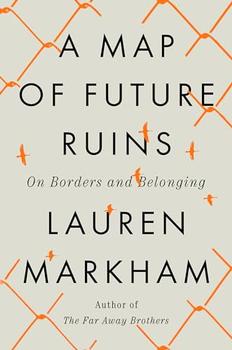Summary | Excerpt | Reviews | Beyond the Book | Readalikes | Genres & Themes | Author Bio

On Borders and Belonging
by Lauren Markham
The growing far‑right groups on the island quickly got word of the fire. They blocked the road to Moria town, where residents had gotten fed up with the refugees after they stole the villagers' goats (to have food to eat) and cut down their olive trees (to keep themselves warm in winter). In the other direction, police blockaded the road to Mytilene. This left thousands of refugees marooned on an empty stretch of road with no reliable food or water or medical care or bathrooms, let alone COVID safety measures. They'd stay there like this for days.
By the following morning, much of the camp had been turned to char and ash, the olive groves a smoldering copse of black harpoons. The wind—it happened to be particularly windy those days—carried the lingering embers, and more fires began. Those who had managed to stay now set off on the run. Every so often, someone would stop to record the fire with their phone—just standing there, swatting the embers away and taking it all in through their miniature screen. It was spectacular and terrifying, watching Moria be eaten alive.
Who started the fires? Theories abounded. The refugees lit the fires, some claimed, desperate to destroy their prison. The Afghans did it, some Arabs and Africans said. The Arabs did it, some Afghans declared. The fascists did it, others believed (they'd burned down a reception center on the island's north side a few years before) to rid the island of the refugees for good. Maybe it was the right‑wing government, people on the left suggested. They, like the far‑right factions, wanted the camp gone—wanted the rest of Greece, and the rest of Europe, to share in the work of housing the people who were continuing to flee metaphoric fires in their own homelands, and who were certain to keep crossing the Aegean, Europe‑bound. A few even posited that one of the NGOs had started the fire, as a bid either to close the camp or to get more money, depending on whom you asked. Or perhaps the fire was merely an accident; by then, more than two hundred fires had erupted in the camp during the seven years since it had opened. But none of these claims was backed up by any concrete evidence.
And yet the government built a quick case. Just two days after the fire was extinguished, the minister of immigration announced that the authorities had found the perpetrators. That afternoon, six young Afghans were arrested.
Who knows how the fires really started. But now that the camp was finally gone, someone had to pay, and it seemed these six kids would do.
Excerpted from A Map of Future Ruins by Lauren Markham. Copyright © 2024 by Lauren Markham. Excerpted by permission of Riverhead Books. All rights reserved. No part of this excerpt may be reproduced or reprinted without permission in writing from the publisher.




When I get a little money I buy books...
Click Here to find out who said this, as well as discovering other famous literary quotes!
Your guide toexceptional books
BookBrowse seeks out and recommends the best in contemporary fiction and nonfiction—books that not only engage and entertain but also deepen our understanding of ourselves and the world around us.